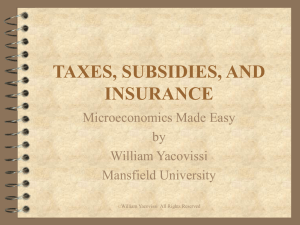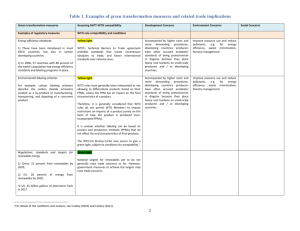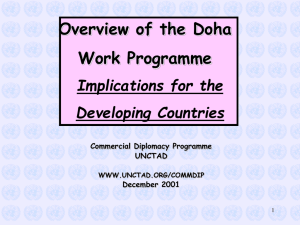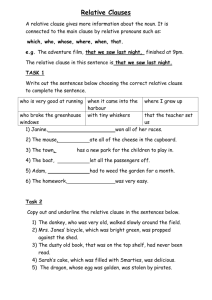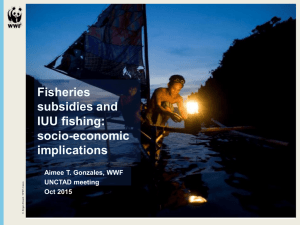The
advertisement
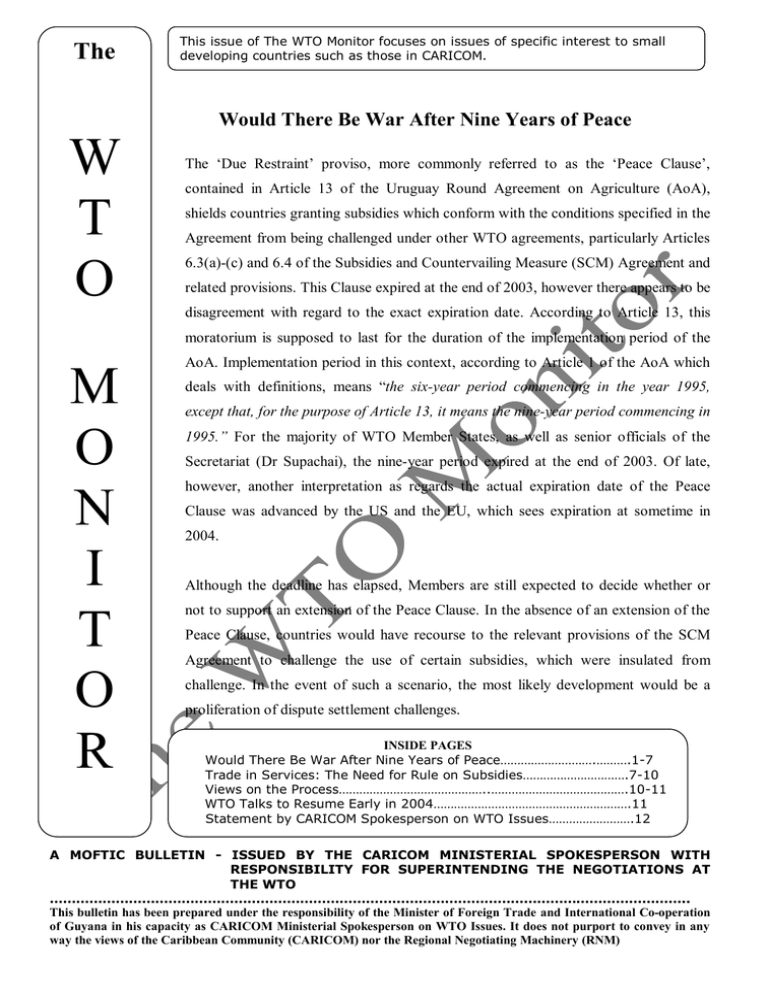
1 The This issue of The WTO Monitor focuses on issues of specific interest to small developing countries such as those in CARICOM. Would There Be War After Nine Years of Peace W T O The ‘Due Restraint’ proviso, more commonly referred to as the ‘Peace Clause’, contained in Article 13 of the Uruguay Round Agreement on Agriculture (AoA), shields countries granting subsidies which conform with the conditions specified in the Agreement from being challenged under other WTO agreements, particularly Articles 6.3(a)-(c) and 6.4 of the Subsidies and Countervailing Measure (SCM) Agreement and related provisions. This Clause expired at the end of 2003, however there appears to be disagreement with regard to the exact expiration date. According to Article 13, this moratorium is supposed to last for the duration of the implementation period of the M O N I T O R AoA. Implementation period in this context, according to Article 1 of the AoA which deals with definitions, means “the six-year period commencing in the year 1995, except that, for the purpose of Article 13, it means the nine-year period commencing in 1995.” For the majority of WTO Member States, as well as senior officials of the Secretariat (Dr Supachai), the nine-year period expired at the end of 2003. Of late, however, another interpretation as regards the actual expiration date of the Peace Clause was advanced by the US and the EU, which sees expiration at sometime in 2004. Although the deadline has elapsed, Members are still expected to decide whether or not to support an extension of the Peace Clause. In the absence of an extension of the Peace Clause, countries would have recourse to the relevant provisions of the SCM Agreement to challenge the use of certain subsidies, which were insulated from challenge. In the event of such a scenario, the most likely development would be a proliferation of dispute settlement challenges. INSIDE PAGES Would There Be War After Nine Years of Peace……………………….……….1-7 Trade in Services: The Need for Rule on Subsidies………………………….7-10 Views on the Process……………………………………..………………………………….10-11 WTO Talks to Resume Early in 2004………………………………………………….11 Statement by CARICOM Spokesperson on WTO Issues…………………….12 A MOFTIC BULLETIN - ISSUED BY THE CARICOM MINISTERIAL SPOKESPERSON WITH RESPONSIBILITY FOR SUPERINTENDING THE NEGOTIATIONS AT THE WTO … … … … … … … … … … … … … … … … … … … … … … … … … … … … … … … … … … … … … … … … … … … … … … … … .. This bulletin has been prepared under the responsibility of the Minister of Foreign Trade and International Co-operation of Guyana in his capacity as CARICOM Ministerial Spokesperson on WTO Issues. It does not purport to convey in any way the views of the Caribbean Community (CARICOM) nor the Regional Negotiating Machinery (RNM) 2 Several of the now 148 members of the non-renewal of the Peace Clause ultimately affect multilateral trading body have openly expressed small developing states? support for and against the renewal of the Peace Clause1. The Cairns Group of agricultural exports This article attempts to address the questions is the most resistant to any extension, while the posed above and it is hoped that this discussion US and the EU are at the other extreme of this will initiate interactive deliberations on this very 2 spectrum . It is therefore expected that, with the important subject, which thus far has been expiration of the Peace Clause, and in the event insufficiently examined countries decide to invoke the relevant provisions of the SCM Agreement, the members of the Cairns The first task at hand would be to establish a link group will be among the first to launch challenges between the Peace Clause and the subsidies against granted to products of export and domestic interest large subsidy-granting countries, particularly the US and the EU. to the region. In so doing, special emphasis will be placed on the European Union-African, Caribbean In determining what position to adopt with respect and Pacific group of countries relationship, as well to the Peace Clause, developing countries in as the EU’s reform to its Common Agricultural general, but CARICOM countries in particular, Policy (CAP). Invariably, when one speaks about have to answer several fundamental questions. the Peace Clause-subsidies link, the products that These include, inter alia, how has the Peace come to mind for many, particularly in the Clause benefited us thus far? How has it hurt us? Caribbean are the Protocol products, especially What are the advantages and disadvantages of sugar under the Sugar Protocol. However, there supporting/rejecting an extension, taking into are two schools of thought with respect to the legal account, among other things, the concerns of net separateness of the Peace Clause and the Sugar food importing countries, preferences and the Protocol. quest for increased market access for product of current and potential export interest to developing It is important to first focus our attention for a countries? If an extension is to our inconvenience, moment on this issue, with a view to clarifying what concessions should be made available to whether the maintenance of the benefits under the developing countries, particularly small resource- Sugar Protocol after the expiration of the Waiver limited states? Should the Peace Clause be is in anyway contingent on the continuation of the modified, and if yes how? Finally, how would the Peace Clause. Sugar is considered to be the most 1 See proposals at www.wto.org The members of the Cairns Group incude:- Argentina, Australia, Bolivia, Brazil, Canada, Chile, Colombia, Costa Rica, Guatemala, Indonesia, Malaysia, New Zealand, Paraguay, Philippines, South Africa, Thailand and Uruguay. 2 3 some Commonwealth Sugar Agreement of 1951, took CARICOM states and as such it is important this effect on 28th February 1975. Hence, the argument issue be investigated. Clarifying this issue would here is that both agreements post date GATT also assist in the investigation as to whether there 1947, and consequently are not covered among the are any direct benefits from the existence of the exceptions. important agricultural product for Peace Clause. However, for beneficiaries of this arrangement, Those who argue that there is indeed a link the Sugar Protocol is a separate international treaty between the flexibilities provided by the Peace between the EU and each of the nineteen ACP Clause and the benefits derived from the Sugar states which are signatory to it for an indefinite Protocol see Article 1 of the General Agreement duration. The Protocol provides remunerative on Tariffs and Trade (GATT 1947) on Most- prices and agreed quantities of cane sugar Favoured-Nation Treatment (MFN) as being the originating from contracting ACP states. It is legal basis. To summarise, the MFN Clause regarded as neither a quota nor a tariff preference requires members to accord any advantage, arrangement. The legal position regarding the favour, privilege or immunity granted to one party indefinite life of the Sugar Protocol is that it is a for any product immediately and unconditionally stand alone agreement which is not lawfully to the like product originating from all other reliant on the existence of the Lome Convention, contracting parties. The exceptions include: or now, the Cotonou Agreement. According to Article 8(2) of the Sugar Protocol, “… in the event - - customs unions and free trade agreements; of the convention ceasing to be operative, the and sugar supplying states … . Shall adopt the preferential trading agreements pre-dating appropriate institutional provisions to ensure the the implementation of the original GATT continued application of the provisions of this in 1947. Protocol.” The argument here therefore is that given that none of the principles enshrined in the All other preferences, such as Lome/Cotonou, WTO agreements can abrogate an existing treaty, must be subject to explicit waivers. A waiver was the Sugar Protocol is regarded as compatible, once granted in 2001 at the Fourth Ministerial the contracting parties find it valuable. Since its Conference held in Doha, Qatar, until 31 genesis, Caribbean countries have benefited December 2007. significantly from this arrangement in terms of revenue earnings. The Sugar Protocol, which is the successor to the 4 Another issue which should be noted with regard Programme on Least-Developed and Net Food- to sugar is that the European Communities in its Importing Uruguay Round concessions did not make any (NFIDC)3. This Decision basically sets out a four export subsidy reduction commitments on sugar of response mechanism: Developing Countries (LDC) ACP and Indian origin. This, however, does not mean that these subsidies are immune from - Food aid; challenge. Since export subsidies are an integral - Short-term financing of normal levels of commercial imports; part of the EU sugar regime, then their elimination - would mean less favourable preferences, since Favourable terms on agriculture export credits; and there would then be no basis for maintaining the - high internal prices from which we benefit. Technical and financial assistance to improve agricultural productivity. The value of the Peace Clause can also be viewed from another perspective, that of net food However, several of the importing countries. Subsidies help to keep food aforementioned prices low and thus benefit net food importing implemented, hence establishing a strong case for countries, since less foreign exchange will be the agreed mechanisms to be implemented rather necessary to satisfy any given demand. The than trying to address the negative effects to benefit from a net food-importing country NFIDC by allowing trade-distorting subsidies. Decision elements are yet in the to be perspective is foreign exchange saved. Since the Peace Clause helps to keep those subsidies in In instances where there is domestic production on place, it therefore can be argued that the Peace any particular product, invariably the implications Clause is beneficial to net food importing are harmful, both economically and socially. But, countries. However, in recognition of the possible by and large, in the fewest possible words, the negative effects in terms of the availability of aforementioned arguments represent the benefits adequate supplies of basic foodstuffs from of the Peace Clause, and therefore are seen as external and legitimate reasons for the continuation of the conditions, including short-term difficulties in benefits arising therefrom. This argument however financing normal levels of commercial imports of may only be well-founded for non-competing basic foodstuffs, in the Uruguay Round Ministers imported products. sources on reasonable terms adopted a “Decision on measures Concerning the Possible Negative Effects of the reform On the subject of how the Peace Clause has hurt us, it is necessary to revisit the arguments posited 3 The full text of the Decision can be found at: http://www.wto.org/english/docs_e/legal_e/35-dag_e.htm 5 for net food importing countries. As mentioned in lucid picture with regard to the costs and benefits, passing, on occasions where there is domestic thereby facilitating a decisive pronouncement, production, the flexibility made available by the preliminary evidence suggest that an extension Peace Clause could result in displacement of would be to our short to medium term advantage domestic production and industries, or restrict and benefit. By rejecting the Peace Clause, non- commercial both conforming subsidies would have to be eliminated traditional markets, as well as emerging markets. immediately or amended appropriately to remove The Peace Clause was created to basically their undesirable effects, thereby forcing the EU to facilitate the reduction process, but there are reconsider its position with regard to preferences, instances where the protection provided by this etc. In the absence of an adequate transition clause has resulted in countries using the shield period, provided to create market share. Agricultural insurmountable. From a Caribbean perspective, products eligible for inclusion in this category the extension of the Peace Clause has to be looked include poultry and fisheries products. at in tandem with the agreed time frame for the expansion possibilities in the establishment adjustment of an costs Economic could be Partnership The foregoing paragraphs for the most part, in Agreement with the EU, as well as the CAP highlighting the benefits and cost of the Peace reform, particularly the shift from price support Clause measures with direct aid payments – beef a case in simultaneously acknowledge the advantages and disadvantages of supporting and rejecting the Peace Clause, point. respectively. Consequently, arising from the existence of the The fact that there are disadvantages associated Peace with the renewal of the Peace Clause leads to an Clause, beneficiary countries would the important question, that is, should the Peace continuation of the moratorium or some other Clause be modified? Further, what concessions mechanism. should be sought? If the former question is undoubtedly be disposed to support answered in the affirmative, the next logical Notwithstanding the obvious limitations of this question is, how should the Peace Clause be analysis, it is sufficient to say that either a renewal modified? No attempt would be made to or rejection of the Peace Clause will cause some definitively pronounce on whether or not the degree of inconvenience, since there are benefits Peace Clause should be modified. Such a question as well as costs associated with either option. is best approached after a detailed quantitative While it is acknowledged that a comprehensively analysis. Instead, at this juncture, we will proceed quantitative examination would provide a more on the theory that modification is necessary. 6 Operating on that premise, possible adjustments to products, regardless of whether or not there was the Peace Clause would be suggested. One tariffication4. However, recourse to the Special important possible amendment which comes to Safeguard Mechanism (SSM) is only effective mind, relates to the category of subsidies shield with respect to imports in a country’s own from challenge by Article 13. The idea here is to domestic market. It does not provide security in establish stringent disciplines on those subsidies third countries market, especially net food that cause injury to us, with the possibility of importing countries which might be an important excluding them from the protection presented by market and source of revenue earnings for the Peace Clause. Or, it may also be desirable to developing countries. Nevertheless, this SSM subject certain payments to the due restraint would provide some level of relief to developing principle which are currently non-actionable for countries farmers against the large subsidies the purpose of imposing countervailing duties. provided by developed countries5. Some have advocate a modification of Article 13 to exclude certain subsidies, notably Green Box Another possible concession could be linking the measures used by developed countries under renewal of the Peace Clause to tighter disciplines paragraphs 5-7 of Annex 2 of the AoA – direct on some types of export competition measures, payments including food aid provision. to producers, decoupled income supports and government financial participation in income-safety-net The final issue which will be analysed is the likely programmes. It therefore means that, operating on consequences to countries, specifically with regard the basis that an extension is granted, say for x to small developing countries in the event of the duration, at the end of that period, the payments non-renewal of the Peace Clause? The non- alluded to would have to be either subject to renewal of the Peace Clause means that all reduction commitments or eliminated altogether. countries that utilise actionable subsidies will be income insurance and vulnerable to challenges under the Dispute This brings us to the question of concessions. Settlement mechanism. In an actual challenge, a There is an emerging school of thought which country has to demonstrate that: suggests that, should a renewal be necessary, a. developing countries should request in return a the exports from another member is clear decision on Special Safeguards, which would causing injury enables all developing countries to have recourse agriculture; or to its domestic to such a facility for all agricultural 4 See article by Bhagirath Lal Das, entitled “The Peace Clause in WTO’s Agriculture Agreement”, available at www.twnside.org.sg 5 7 b. the subsidy used by a member is Based on the above investigation, it is very causing serious prejudice to its exports. difficult to definitively pronounce on whether the Peace Clause should be renewed or not although However, most developing countries, especially preliminary evidence supports a renewal. In many small developing countries such as those in instances, more in-depth analysis of the various CARICOM use of subsidies is negligible, because issues raised in necessary, particularly with respect of, inter alia, lack of resources and Bank and Fund to the effects of subsidies on domestic markets, commitments. Further, the subsidies used by these inter alia. What is important nonetheless is that countries tend to conform to the commitments in most of the factors that need to be taken into the WTO agreements. Moreover, given that proof consideration prior to any decision making have of injury is a precondition for getting a favourable been identified. Whether it is possible to complete judgment, it would be extremely difficult for a the necessary in-depth analytical work that is developed country to prove that serious injury is required before a decision is required on whether being caused to a domestic industry in the or not to renew the Peace Clause is a guess, since developed country as a result of subsidies used by this will be determine to a large extent by the a small availability of resources and accurate data. It is developing country. Proving the opposite will be a however being strongly recommended that the less difficult task, since developed countries do region re-examined the issue more in-depth. developing country, especially a have the financial resources and do significantly subsidise, their farmers (see footnote # 4). Trade in Services: The need for rules on Subsidies Roger W. Rogers, Foreign Trade Officer, Guyana Introduction work of the WTO since 1995 suggests that this objective has certainly become a formidable When the WTO was established in 1995, with the challenge, which has prompted the conclusion conclusion of the Marrakech Agreement, among from many that sustainable development through the objectives (and one may add the most trade is but an illusion. Therefore, the question important) of this premiere trade organisation was that arises for developing countries is precisely to enhance trade amongst its members. More how this can be achieved? specifically for developing countries it states that the purpose of trade is to contribute to sustainable In the area of services, the conclusion of an development6. However, an assessment of the agreement on rules to discipline the use of 6 Developed countries (the EU, US and Japan) subsidize their farmers to the amount of US$300 billion yearly. What works? Trade, Policy and Development: C. Mohamed; pg. 1 8 ? subsidies in the services sectors will have important implications development, for particularly for for the purpose of the negotiations, sustainable “exchange developing subsidies related to trade in services”. information concerning all countries. However, this mandate lacked an initial a Such disciplines are necessary albeit not sufficient for ensuring much sought market access and for creating a more equitable multilateral trading regime which would redound to the benefit of developing countries. Disciplines are even more important given that generally developing countries do not have the resources as most developed countries to utilize domestic support in their trading regimes. deadline. This situation was later changed with the approval of the services Negotiation Guidelines. The ‘Guidelines’ for the current services negotiations contain a ‘best endeavour’deadline to develop multilateral disciplines for such subsidies prior to the conclusion of the Doha Round ‘single undertaking’ (market access negotiations) negotiations in January 2005. What is a subsidy? The Mandate The issue of what is a subsidy has engage WTO Members have conceded that subsidies may have distortive effects on trade in services. This is explicitly recognized by Article XV of the GATS. substantial discussion within the Working Party on GATs Rules (WPGR). There has been a number of views expressed, ranging from one extreme to the other. However, the discussions are far from being Members were therefore mandated to: resolved. While many Members are supportive of ? ? hold negotiations “with a view to develop a simple working definition, others are of the view the necessary multilateral disciplines to that a special definition is required for the avoid such trade-distortive effects”; particular case of services7. The latter catering to what may be termed “the peculiarities of the consider “the appropriateness of services sector.” countervailing procedures”; Countries supporting the use of a simple definition ? recognise the “role of subsidies in relation argue that the WTO Agreement on Subsidies and to Countervailing Measures (SCM) contain a useful the development programmes of developing countries”; ? definition for services8. On the other hand, some take into account the “needs of Members, particularly developing countries” for Members argue that the definition contain in Articles 1 and 2 of the SCM Agreement is not flexibility; and 7 8 Rediscovering Subsidies in the Services negotiations 9 adequate. A view in support of this position was treatment (NT) principles, these subsidies must be articulated by Professor Marc Benitah, who argued subject to non-discrimination. This was done by a that the principle of territoriality applied to number of developed countries (e.g. US, EU, subsidies rules in goods is not helpful in the area Japan). of services9. He argued that because most subsidies in services are provided locally, and this The provision contained in Article XXIII.3 of the does not preclude a subsidised entity from GATS has some theoretical value in disciplining providing services by other modes of supply to, or the use of subsidies. This article by allowing the within, third countries. This conceptual difference deposit of additional commitments, a Member makes the notion of an ‘export subsidy’ more could ambiguous and less useful than it is in the goods subsidies. However, this is only applicable in sector10. specific sectors. In the final analysis, these include not granting or phasing-out provisions are woefully inadequate in the current This is a valid argument and strengthens the need for developing countries to have this important issue resolved. For developing countries therefore, any definition of subsidy in the services sector, GATS rules and do not sufficiently discipline the use of subsidies, either on an across-the-board basis or with respect to the amount of subsidies, or the areas to which a subsidy is being granted. while it may contain all the basic elements of the definition contained in Article 1 of the WTO Public Policy Objectives Agreement on Subsidies and Countervailing Measures (SCM Agreement), must also reflect the Article XV of the GATS provides that only particular nature of the services trade and the subsidies with ‘distortive effects’ should be nexus to sustainable development. subject to possible multilateral disciplines. In economic theory, all subsidies are considered trade The GATS and Subsidy The General Agreement on Trade in Services (GATS) does have some general provisions which can be construed as limitation on the use of subsidies by WTO Members. It provides for example that if, a member when depositing a commitment under the GATS, does not exclude granting subsidies from the application of the most-favoured nation (MFN) and the national 9 ditto book name 10 distorting since they are interventions that impinges on the natural conditions of a competitive market11. However, at the same time subsidies (active policies) are an important tool for achieving sustainable development objectives. Therefore, in certain cases priority must be given to developing countries’ justifiable aim to pursue public policy and by extension development objectives in favour of avoiding trade distortions. 11 ditto 10 Therefore, there is an urgent need to create and While developing counties may not yet have a big preserve spaces for public policy objectives. share of the services trade, they are pursuing options to create opportunities for diversifying In this regard, many WTO Members support this fact and argues that subsidies necessary to achieve certain public policy objectives should be exempted from general subsidy disciplines. This is supported by the GATS, which provides that Members’ needs for flexibility in the area of subsidies are to be taken into account. production and exports towards increased valueadded and knowledge intensity. If the services trade evolves along the lines as trade in goods, many developing countries will gradually be in a position not only to be competitive, but possible overtake developed countries in certain services sectors in terms of competitiveness. The issue of In addition to this general concern, many developing countries are calling for greater policy spaces for development policies for developing Subsidies would then become a major stumbling block, which could seriously hamper the economic development of developing countries. countries only. This is to be included under the provisions for special and differential treatment (S&D). These countries are of the view such S&D must be part of the final results of the Doha Round, to give meaning to the Development dimension envisage. In other words, the conclusion of the Doha Round WTO agreements should provide policy spaces to allow the undertaking of ‘active’ policies by developing countries, including those related to subsidies. Therefore, developing countries should push for a resolution on the desirability of services subsidy disciplines. Moreover, a definitive time frame should be established by which negotiations on subsidies in services must conclude. Finally, services subsidies negotiations should end before Members table their final offers, as Members can only then undertake an adequate evaluation of the actual value of the offers received from trading partners. Conclusion VIEWS ON THE PROCESS Dr Supachai Panitchpakdi, Director General, WTO November 2003 “The sluggish performance in global trade and the member governments prospects for weak trade expansion in 2003 negotiations to get back reinforces the already pressing need for WTO Rediscovering Subsidies in the WTO on global trade track.” 11 Don Mc Kinnon, Secretary-General, Commonwealth Secretariat November 2003 “After the breakdown of trade talks in Cancun, all realise that everyone stands to lose from another the players must reconsider their positions and failure.” Ambassador Carlos Perez del Castillo, Chairman of the General Council December 2003 “We have made progress towards a full re- business.” I hope with a little bit more time launching in a sense of doing by the 15 available … ..we will be able to make progress December what ministers failed to do in in the next few months and finally we will be Cancun (Mexico). “But we are not yet there able to get this process that everyone wants and we will need some more time.” “I would … ....completely back on track early next year.” not call it a failure, I would call it unfinished WTO Trade Talks To Resume on 11-12 January 2004 At an Informal Heads of Delegation (HOD) the consultations with member states; and finally meeting on 9 December, the Chairman of the a sense of the way forward. Since the collapse of General Council, Ambassador Carlos Perez del talks consultations were held on the four issues Castillo updated members on the status of that have been identify by the Chairman (14 informal talks he had, as well as outlined the way October) as being the most contentious in his forward. Instead for producing a new draft, view – agriculture, non-agricultural market which several members would prefer, the Chair access, instead issued a report at the General Council’s competition policy, transparency in government December 15 meeting, mandated by ministers in procurement and trade facilitation) and cotton Cancun at the fifth Ministerial Council. subsidies. The report dealt with three issues, namely – a substantive review of progress made thus far, identification of key issues that emerged during Singapore issues (investment, Chair Perez del Castillo encouraged all of the Doha development Agenda bodies to resume work early in 2004 once the Chairmanship issue is settled. Statement by Hon Cement J. Rohee Minister of Foreign Trade and International Cooperation and CARICOM Spokesperson on WTO Issues on Recent developments pertaining to the WTO Negotiations As CARICOM’S Spokesperson for WTO issues, negotiating process and continues to examine all I welcome the recent positive statements by proposals advanced thus far. In this regard, at a several WTO Member States and group of meeting in Georgetown in November 2003 with countries, especially the developed countries the Director General of the WTO, as well as the such as the United States, the European Union Chairman of the Cancun Ministerial Conference, and the G 20, urging the revival of the Doha CARICOM Trade Ministers indicated their Round of trade talks, so as to ensure a successful willingness to be flexible with regard to the conclusion by January 1, 2005. “Singapore issues”. The Ministers emphasised that the “Singapore issues” should be considered Having engaged in an extended period of secondary to the resolution of the core issues, refection, it is essential that all members return to especially Agriculture, Non-agriculture Market the negotiating table, so as to resolve the difficult Access and Special and Differential Treatment issues that have plagued the Round for some for small economies. time. However, such a resolution can only be accomplished by demonstrating flexibility, while Progress cannot be made if members continue to simultaneously ensuring that the developmental adopt rigid positions articulated in the pre- dimension of the Doha Round is adequately Cancun process, and at the Cancun Ministerial accommodated. We owe it to our constituencies Conference. The first meeting of the WTO to General Council is scheduled for 11-12 February find innovative ways to resolve contentious issues expeditiously. the 2004. It is important that we all demonstrate the political will to resume the negotiations with a CARICOM remains committed to the Doha renewed sense of purpose and commitment. January 23, 2004, Georgetown Articles from The WTO Monitor can be reproduced provided that the source is acknowledged. The Bulletin can also be accessed from the MOFTIC website. All comments can be forwarded to the following email addresses: minister@moftic.gov.gy or ghd26@hotmail.com The WTO MONITOR c/o Ministry of Foreign Trade and International Cooperation Tel. 592-226-5064 Fax.592-226-8426 Email: minister@moftic.gov.gy A MOFTIC Bulletin
